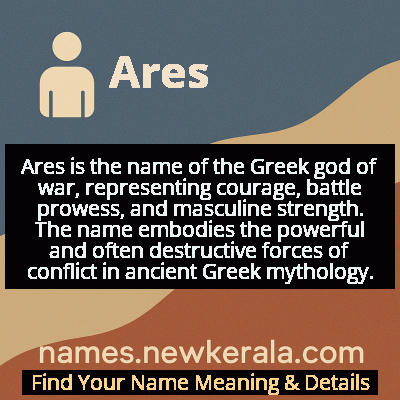Ares Name Meaning & Details
Origin, Popularity, Numerology Analysis & Name Meaning of Ares
Discover the origin, meaning, and cultural significance of the name ARES. Delve into its historical roots and explore the lasting impact it has had on communities and traditions.
Name
Ares
Gender
Male
Origin
Greek
Lucky Number
7
Meaning of the Name - Ares
Ares is the name of the Greek god of war, representing courage, battle prowess, and masculine strength. The name embodies the powerful and often destructive forces of conflict in ancient Greek mythology.
Ares - Complete Numerology Analysis
Your Numerology Number
Based on Pythagorean Numerology System
Ruling Planet
Neptune (Ketu)
Positive Nature
Intuitive, analytical, spiritual, and inquisitive.
Negative Traits
Secretive, reserved, aloof, and can be overly critical.
Lucky Colours
Green, yellow.
Lucky Days
Monday.
Lucky Stones
Cat’s eye, moonstone.
Harmony Numbers
1, 5, 6.
Best Suited Professions
Scientists, researchers, spiritual leaders, detectives.
What People Like About You
Depth of knowledge, analytical skills, spirituality.
Famous People Named Ares
Ares I
Ancient Spartan King
Mythical early king of Sparta, father of Theras who colonized Thera
Ares of Lacedaemon
Ancient Greek Warrior
Historical Spartan soldier mentioned in ancient texts for battlefield valor
Ares Halandriános
Modern Greek Scholar
Greek historian specializing in military history and classical studies
Name Variations & International Equivalents
Click on blue names to explore their detailed meanings. Gray names with will be available soon.
Cultural & Historical Significance
In broader cultural context, Ares represents the necessary but dangerous element of human conflict that ancient Greeks both feared and acknowledged as essential to their worldview. His mythology served as a cautionary tale about the consequences of unchecked aggression while recognizing war as an inevitable part of human existence. The contrast between Ares and Athena (goddess of strategic warfare) reflects the Greek understanding of different approaches to conflict - one representing brute force, the other representing wisdom and strategy.
Extended Personality Analysis
Individuals named Ares are often perceived as possessing strong, assertive personalities marked by courage, determination, and leadership qualities. They tend to be natural protectors with a fierce loyalty to those they care about, embodying the warrior spirit of their namesake. However, this strength can manifest as aggression or impulsiveness when not properly channeled. The name suggests someone who confronts challenges head-on, thrives under pressure, and possesses an innate competitive drive that pushes them to excel in demanding situations.
Beyond the obvious warrior associations, the name Ares carries subtler psychological implications. Those bearing this name often develop a complex relationship with their own strength and aggression, learning to balance their powerful nature with compassion and restraint. They may feel a sense of responsibility to use their strength wisely and protect others, evolving beyond mere combativeness into mature leadership. The mythological background provides a rich symbolic framework that can influence personal development, encouraging the cultivation of courage while warning against the dangers of unchecked anger and destruction.
Modern Usage & Popularity
In contemporary naming practices, Ares has emerged as a distinctive choice for parents seeking a powerful, mythological name with classical roots. While still ranking outside the top 500 names in most English-speaking countries, its usage has shown consistent growth since the early 2000s, particularly in the United States, United Kingdom, and Australia. The name appeals to diverse demographics - from classical scholars to parents simply drawn to its strong, single-syllable impact. Its popularity has been bolstered by appearances in popular media, including the Wonder Woman film franchise and various video games. Modern usage often focuses on the positive aspects of the mythological figure - courage, strength, and protection - while downplaying the more violent connotations, reflecting a contemporary reinterpretation of ancient archetypes.
Symbolic & Spiritual Meanings
Symbolically, Ares represents the primal forces of conflict, courage, and survival instinct inherent in human nature. Beyond literal warfare, the name embodies the concept of struggle against adversity - the internal and external battles that define human experience. It symbolizes raw power, unbridled passion, and the willingness to fight for one's beliefs, principles, and loved ones. In psychological terms, Ares represents the shadow self that must be integrated - the aggressive impulses that, when properly channeled, become sources of strength, protection, and positive action. The name also carries connotations of masculine energy in its most elemental form, representing both the destructive and protective aspects of male archetypes that must be balanced for wholeness and maturity.

